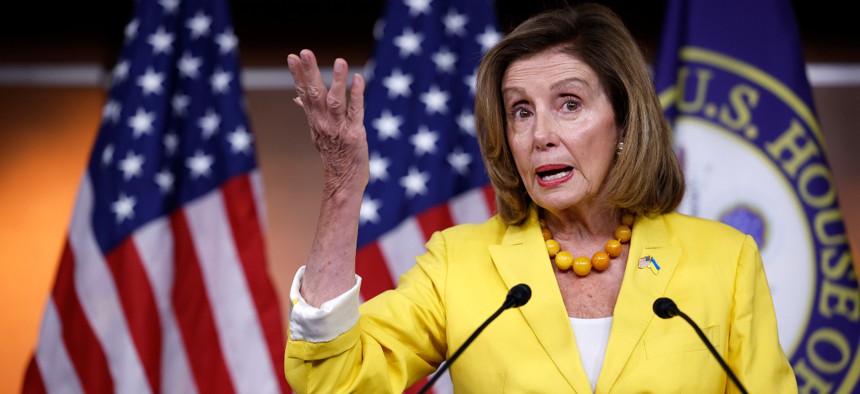
Chip Somodevilla/Getty Images
House Sends Package that Includes an IRS Hiring Boost and USPS EV Funding to Biden
The measure aimed at lowering health care costs and fueling the fight against climate change received only Democratic support.
The House on Friday approved a sweeping bill to address many of Democrats’ priorities, ranging from climate change to prescription drug costs, sending to President Biden a measure that will boost hiring at several agencies and provide others with significant funding surges.
The partisan Inflation Reduction Act received only Democratic support after clearing the Senate only after Vice President Kamala Harris cast the tie-breaking vote last week. Spending at the Internal Revenue Service in the bill has become a lightning rod in the discussions of the bill, with Republicans casting grave warnings that new hires at the agency will lead to burdensome audits for average Americans. Opponents of the bill have exaggerated its impacts on the IRS workforce, however, and miscast the goals of the new funding.
The measure will invest $80 billion over 10 years at IRS, reviving a proposal floated since lawmakers for first floating ways to offset spending for a bipartisan infrastructure bill. The Congressional Budget Office estimated it would raise more than $200 billion in revenue, or a net of $124 billion. The law will allow IRS to hire as many as 87,000 employees over the next decade. Democratic lawmakers and the Biden administration have called the surge necessary to restore the agency after massive cuts that have taken place at the agency over the last decade and to crack down on high-earning tax cheats.
During floor debate on Friday and throughout the last week, Republicans have claimed the hiring would “double the size” of the IRS and that new audits would target low and middle-income Americans. The Biden administration has forcefully pushed back on that suggestion, with IRS saying it could lose as many as 50,000 employees through attrition over the next few years and most of the new hires would simply fill those vacancies. A Treasury Department official called the claim that the hiring would double the size of the IRS “absolutely false.”
"A large portion of these hires will fill vacancies of employees who have left or who will in coming years leave or retire from the agency," the official said, adding that those employees would work not just in enforcement but in IT and customer service as well.
Advocates for the change, who include the current and many former IRS commissioners, said the agency is taking on more work than ever and has neglected much of its core mission as staffing has continued to decline due to prolonged budget cuts. The hiring would bring the agency back to the staffing levels it last experienced in the early 1990s.
The bill was nearly two years in the making and is significantly slimmed down from the original $3.5 trillion package Democrats first pitched last year. The agreement, struck after months of negotiations between Senate Majority Leader Chuck Schumer, D-N.Y., and Sen. Joe Manchin, D-W.Va., includes a total of $433 billion in new spending, though lawmakers estimated the revenue accompanying it would lead to a net deficit reduction of $300 billion.
The U.S. Postal Service will also see major benefits from the bill. Democrats set aside $3 billion for the mailing agency to purchase more electric vehicles and charging stations. USPS is in the process of replacing its decades-old fleet and plans to purchase 165,000 vehicles over the coming years. Postal management initially said just 10% of an initial order from its contract for custom-built trucks would be electric, causing widespread pushback from Congress, the White House and environmental advocates. Just last week, USPS announced it was upping that to 40% of the first 84,500 vehicles the agency will purchase.
The Postal Service has not said exactly how many EVs it will purchase with the added funds, though Postmaster General Louis DeJoy has long held that he would happily buy more if Congress paid for it. DeJoy recently said the agency only got as high as around 70% electric in its previous calculations when assuming a cash infusion from Congress. Kim Frum, a USPS spokeswoman, recently said the agency expects the electric portion of its fleet to “evolve upward” based on changes to its operational, technological and financial circumstances.
“We have been monitoring the interest of Congress in funding an increase in electrification and should funding be enacted we will assess the impact on our plans,” Frum said.
The bill will invest a total $369 billion to boost energy security and fight climate change. The Inflation Reduction Act will provide $500 million to the National Parks Service to fill longstanding vacancies and increase its workforce. Lawmakers expect the bill to fund a total of 5,000 hires spread out over the next decade. NPS staffing has declined from 16% over the last decade to less than 19,000, while visitation to National Parks has increased by 18% in the same period.
The Health and Human Services Department will gain the responsibility of negotiating drug prices for Medicare, while the Energy Department will receive an influx of new funds to boost clean energy research. The National Oceanic and Atmospheric Administration will receive $20 million and the Environmental Protection Agency $40 million to hire staff to improve their permitting processes. The Federal Energy Regulatory Commission will be allocated $100 million, the Energy Department $125 million and the Interior Department $150 million to boost their rolls for environmental reviews.







